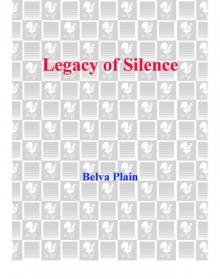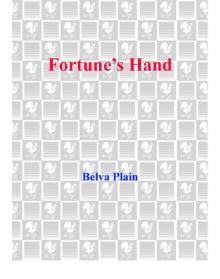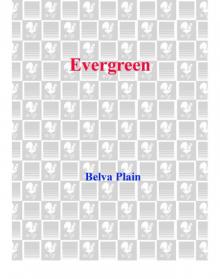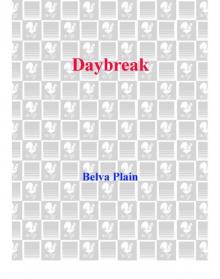- Home
- Belva Plain
Eden Burning Page 38
Eden Burning Read online
Page 38
As for himself, after the first nervous, hesitant week or two, things had begun to pick up, “things” being his own sense of confidence. He was even becoming inured to the long days, the late nights, the voice gone hoarse, the food to be stuffed down his throat, and the hands to be shaken. All in all, he was doing better with this campaign than he would have expected a normally reserved, almost a reclusive, man to do.
Men were rushing about now, trying to quiet the crowd. Someone bellowed, pleaded, and commanded over the microphone. It was clouding up and they’d want to get the speech finished before the rain came. Patrick glanced over the assemblage. There was the usual cluster of journalists, some, now that this part of the world had drawn the rest of the world’s attention to itself, having come even from European countries. More white faces fringed the crowd: a few curious tourists, the planter Fawcett and the Whittaker nephew who was known to be “liberal,” the youngest Da Cunha son with friends, and of course, Kate and her staff, who followed all the campaign speeches, Nicholas’s as well as Patrick’s. All of these stood forth from the dark-faced mass.
When the noise ceased the hush was absolute. They were waiting for what Patrick had to say. And as always, he gave himself a mental reminder to speak in strong, clear language. He might not be able to bewitch them with passionate oratory nor impress them with his manner and dress, but he could surely speak to them in language they would understand about things they would understand. He reminded himself also: never underestimate the intelligence of the “common” man.
His points were simple and consistent. He had said before, and would say again, that they were a farming people, that they would remain a farming people, and that such industries as they must establish would stem from agriculture.
“We are told about world markets and such things as balance of payments, all fancy expressions to describe and explain why we are poor, why some of us go to the cold north to pick apples in another country, why shoes cost so much, as do soap and even sugar, which although we raise it here ourselves, so many of us can’t afford to buy.
“Yes, you’ve heard all this. Our present leaders asked for your vote because they promised to do something about these things. Now, we all know they can’t be changed overnight; the structure of years can’t be overhauled in hours. But you do have to make a beginning! Here we are, approaching the third year of this administration, and I see not one small sign, none at all, that anybody cares to alleviate any of our pains. Have you?”
A roar went up: “No! No!”
“What I do see is a display of fantastic luxury in high places. I see men in red uniforms—expensive ones, by the way, as are their fancy barracks and their new cars. Yes, men in uniform with large fists in white gloves and”—he paused—“men without uniform, who stalk and spy among you, extorting taxes, often known as contributions. Contributions, mind you, while they rob and beat, terrifying you in your homes at night, silencing your tongues.”
And while he spoke, other recollections, sharp as hooks, attacked him: the farmer who, having written an open letter protesting taxes, was found dead in his field when he failed to come in for lunch; the son of one of Clarence’s old union friends who’d come home, after three days’ detention on some vague charge, with an empty socket instead of an eye; his own Will, who’d returned one night with torn clothing and a knife slash. “A fight over a girl,” he’d said only, but he hadn’t left the house for a week.
“Even under colonial rule we never knew terror like this. People never disappeared. People weren’t afraid to talk out loud in public places.”
The silence was so deep that he thought he could hear them all breathing, or hear a long collective shiver and sigh. Behind him on the platform he did hear his bodyguards shifting in their seats. They were wary and nervous.
“You lay it on pretty thick, Boss,” one had told him only yesterday. “You’re not afraid?”
“The foreign correspondents are my safeguard. If anything should happen to me,” he’d answered, “wouldn’t it prove that everything I’ve been saying is correct?” He almost believed that himself.
Plowing back into the substance of the speech, making promises, but not too many, promising only to give his honest effort and, above all, to remove the terror, he rose at last into a peroration and stood to acknowledge the applause.
The dark peasants gathered their children and departed. I must have had great-grandparents who looked like them, he thought, or maybe great-greats. Who knew? For a moment, half unconsciously, he stretched out his hand to look at it, then remembering where he was, put it quickly into his pocket…. Two young blond photographers from some news service were taking pictures of Patrick and the crowd, while he, looking back at them, felt again, as so often, that old confusion—I am of them, too—a confusion that would never leave him, he knew well.
When, after the last applause, he turned to step down from the platform, the rain came. The sky opened. The soaking rain pounded a furious drumbeat on the earth, so that the foreign newsmen, astonished at its vehemence, went scuttling to their cars.
Patrick’s car was a station wagon seating nine, among them Kate and her two young cousins who worked on the Trumpet. Franklin Parrish sat in the rear with Patrick, who could sometimes stretch out a little there to rest.
“The rain will be over by the time we get to the next place,” Franklin said. “This was a very responsive crowd, I thought. Not one heckler in the lot. You know, Boss”—although Patrick disliked the appellation Boss and had told Franklin so more than once, it still slipped out occasionally in pure affection—“you know, Boss, I’m beginning to think we might make it after all.”
“We’ll see,” was all Patrick said.
The other side had the money and the power. Best not to think farther ahead than each day’s uphill climb. Still, he was grateful for Franklin’s confidence. The young man’s intelligence and enthusiasm nourished and sustained him. If he won, he was resolved to put Franklin into a position of importance and trust. Not that the young man needed Patrick’s sponsorship, for he was obviously destined to rise in the party ranks through his own abilities, his firmness, his tact, and his welcome smile. He was a fine speaker with a natural talent, unlike Patrick, who had taught himself through his persevering observation of Nicholas Mebane. Franklin was clever enough, too, to utilize a few politician’s tricks.
“Look at me,” he’d say. “I am one of you.” Referring, of course, to his color, which was as dark as any worker’s.
Patrick smiled inwardly. It was pretty clear that Parrish was having serious thoughts about Laurine and that she, now almost twenty years old, was having thoughts of her own. Patrick and Désirée had even talked about it. Désirée had raised objections: “He’s too black,” she’d said. And Patrick had put her arm next to his own, making an elaborate play of doing so. “Too dark,” he’d said, in such a mock-tragic tone that she had begun to laugh at herself. “Thank goodness for your sense of humor,” he’d told her.
The car, last in a short procession, turned inland and uphill. Alongside the road Patrick observed a farmer, helped by his neighbors, building a house. They were wattling and thatching. There would be food and drink for them all when the job was done, he knew. And he laid his head back on the seat, closing his eyes, thinking of the kindly comfort there was in such a continuation of old ways during this time of speeding change.
He’d seen more of country life during these weeks of his campaign than he’d seen in a long while, ever since he’d begun to live in the town. He’d gone looking for votes in the sugar factories, where, although the windmills were gone, the workers still skimmed the boiling foam and tested the liquid thread between the forefinger and thumb to judge when to strike. He’d eaten chicken and yams and drunk mint tea with prosperous farmers in their comfortable homes. Oh, yes, there were many such farms on which the descendants of slaves worked their own fields, played with their children, and married off their daughters to the sound of music! He’d talked
to teachers while children played cricket on the village green, exactly as he had once done. He’d talked to planters at the Agricultural Show; most of them, he knew, would be on the other side, with Nicholas, for “law and order;” nevertheless he’d tried to show them he was for better law and order…. Certainly it never hurt to try. And he remembered now, apropos of nothing, that he’d seen Osborne there, standing before a pen, guarding a handsome cream-colored bull. There to collect the prize for Francis, probably! A queer pain shot through him, making a shudder and a chill.
He opened his eyes.
“You dozed some?” Franklin asked. “You needed it. Did I tell you that young Da Cunha sent us a check?”
“The older brother’s for Mebane, I take it? Like the father?”
“The father, yes, of course. The brother, though, doesn’t care one way or the other. Whatever’s better for business is what he’ll be for.”
The road was dry and dusty, for on this side of the Morne it had not rained. They drove through a string of villages, where, the caravan having been expected, people had come out to stare, more often now to wave and cheer. It occurred to Patrick suddenly that he might really, after all, win! The prospect thrilled him and scared him, too: what had he let himself in for? He pushed the thought away.
“You’ve made an impact,” Franklin said positively. “More than we’ve realized, I think.”
“We’ve still a long way to go.”
“True. But if we lose, we’ll try again. We’ll have to, that’s all.”
Franklin was actually enjoying himself, which was surprising. One wouldn’t expect a bookish fellow like him to like this business. The strategy of government was one thing, but the hullabaloo of an election was quite another.
“If we lose,” Patrick said, “you’ll carry on. You and your generation.”
Franklin was astonished. “Why, you’re a young man! What are you talking about?”
Kate, sitting in front, had overheard. “You’re only forty-one, Patrick! How can you talk like that?”
They were right, of course. Still it was good to see many young people ready to go forward, a man like Franklin’s cousin, for example, that thin fellow with the odd green eyes, home on vacation from the University of the West Indies, so reasonable, intelligent, liberal, never fanatical. And he thought of Will, then blocked out the thought.
“I wish,” Kate said, “I had the courage to come out flatfooted for you. This business of presenting both sides equally as ‘news’ just sickens me.”
“You’re doing a good job this way,” Franklin told her. “At least, you’re printing Patrick’s message so people can judge for themselves. The other way, if you took sides, they’d just close up your paper. You know that.”
“You’re a great help, all of you,” Patrick said softly.
The road mounted through cane fields toward more hills; ahead, you could see the dance and dazzle of the heat; on the platform the sun would burn; he would be glad to get this over with for today.
“Good God,” Franklin cried, as they approached the meeting place, “there must be two thousand here! It’s the largest yet!”
From miles about they must have collected, to stand now sweating and fanning themselves with their straw hats, drinking beer and nursing their babies, while they waited for the afternoon’s event.
Patrick got out of the car and mounted the platform. He saw, with his new “political” eye, that there were many young in the audience, so he began by addressing them.
“The world is harder for the young today. There are more of you, and you have higher aspirations, which you should have. I think I understand the young because I’m a teacher. So you’ll forgive me if I’m long-winded, like a teacher.” He paused for the laughter, aware that it was a good thing to begin a speech with a little joke, preferably at one’s own expense.
“A great responsibility rests upon the educational establishment … not to raise everyone to the top of the heap, which is a quite obvious impossibility, in spite of the worldwide propaganda to the contrary, because men are not equal in their capabilities … nor to lower everyone to the same bottom … to want that is only futile envy and revenge … no, to give every person the chance to climb up if it should be in him to do so…. That and that alone is the voice of fairness, decency and common sense…. I ask you to listen…. I favor a mixed economy, government to do those things that governments do best and free enterprise to do the rest.”
Patrick’s eyes moved over the crowd, which was listening, with interest. At the far edge of the field, where trucks and Hondas were parked, he thought he saw a flurry of arriving cars, latecomers. The heat was dizzying and he hastened on toward a close.
“I made a little joke before about talking too much. I’ve really tried not to. I hope you’ll go home and give thought to what I’ve said, then come out and vote against this regime which will, if allowed to continue, drive you first to despair, and in the end, I’m afraid, to communism.”
“Dirty communist yourself!” a man cried. Cries came from all over the field. “Smash the son of a bitch! Yeah, dirty communist himself!”
Cries came as a line of men shoved forward from the rear of the field.
“Shut up! Shame! Throw them out!”
Somebody hurled the first stone. A woman screamed as a man fell with the blow. Then, with the suddenness of an earthquake or explosion or any cataclysm that gives no warning, the field erupted into chaos.
From all sides and as if from the sky itself came a bombardment of stones. Chairs and tables went hurtling. From somewhere came the stench of rotten eggs: precious eggs! Men wrestled, women wailed in turn and fell on one another, trying to flee. In the confusion, it was impossible to tell who was assaulting whom. Some seemed to be joining up with the invading ruffians. A hail of paper bags descended on the crowd to burst and spatter their incredible contents of excrement and garbage. Police, appearing out of nowhere, melted into the crowd, some attempting to attack, some trying to restore order, and some observing, doing nothing.
“Stop it! Stop it!” Patrick heard his own frenzied, futile screaming. His throat strained with his screams, even after he had been struck with some foul liquid that soaked his shirt and knocked him, for a moment, to the ground. It was unbelievable, first this attentive meeting and an instant later this vicious brawl!
Somebody helped him up. Out of the savage mob men mustered in a ring, three deep, around him. The outer ring, as they pushed him through the uproar toward his car, sustained a bloody battering. Men armed with clubs and nail-studded boards went flailing. Patrick saw Franklin dodge a blow. Stumbling and shoving, they edged toward the car.
We won’t make it, Patrick thought. Strange way to meet your end, in an open field on a blazing summer day, at the hands of Mebane’s thugs.
And suddenly the crowd fell back. A dozen or so young men, coming from behind the row of cars which Patrick and his men were trying to reach, stepped forward and threw.
“Tear gas!” Franklin cried. “Run, run!”
Over their heads and behind them the acrid cloud sprayed. The engine was already racing in Patrick’s car; it was in motion before the doors had even been closed, and they were out of the field, onto the road, with tires skidding in a foam of dust when a last stone smashed through the windshield.
“The tear gas?” Patrick gasped. His eyes stung. “Whose?”
“Our own people. We were prepared for something like this. We knew it was bound to come eventually,” Franklin said.
“My God, I hope there weren’t too many hurt!”
“Bastards! Are you all right, Patrick?”
“Yes. A stone got me in the shoulder. And I stink. Other than that, I’m all right.”
Désirée was furious, scolding and weeping as she brought clean clothes for Patrick. “You idiot, you could have been killed!”
They were on Clarence’s porch. Crippled with arthritis, he had taken to the old custom of sleeping out of doors in a hammock.
“Triumph!” cried Désirée. “Thrill! Is that what you call this?”
Clarence ignored his daughter. “I’ve news for you. This afternoon, while you were out there, the trade union congress voted unanimously to support you.”
“Well, I shouldn’t think they’d want Mebane,” Patrick said, pleased.
“No, but you might think they’d want the left wing, mightn’t you? And they don’t. They don’t want the radicals. They want you.”
“Everybody wants you. They’ll destroy you with their wanting,” Désirée mourned. Then anger seized her again. “You’re nothing but big, overgrown boys, the two of you, sitting here boasting over this—this horror! You’re naïve, that’s what you are, naïve.”
The adjective amused Patrick, since it was one he had always privately applied to her.
“I wish you could see yourselves,” she went on. “Neither one of you has faced the truth of what life is!”
“Well, well,” Clarence said. “Suppose you tell us, then.”
“I’ll tell you what it isn’t! It’s not knocking your brains out, eating your heart out, sacrificing your health and safety for other people, when they don’t give the least damn about you! Do you actually think all these people here in this dinky place really care who’s elected?”
“Yes, I do think so,” Patrick said.
“Well, you don’t know what you’re talking about! All they want is food to feed their faces with and enough rum, and bed on Saturday night—”
Patrick smiled at her modest words.
“—and you think they’ll ever thank you for giving them the means to get what they want?”

 The Golden Cup
The Golden Cup Her Father's House
Her Father's House Whispers
Whispers Crescent City
Crescent City Legacy of Silence
Legacy of Silence Crossroads
Crossroads Promises
Promises After the Fire
After the Fire Tapestry
Tapestry Looking Back
Looking Back Heartwood
Heartwood The Carousel
The Carousel Fortune's Hand
Fortune's Hand Homecoming
Homecoming Random Winds
Random Winds Harvest
Harvest Evergreen
Evergreen Treasures
Treasures The Sight of the Stars
The Sight of the Stars Secrecy
Secrecy Daybreak
Daybreak Eden Burning
Eden Burning